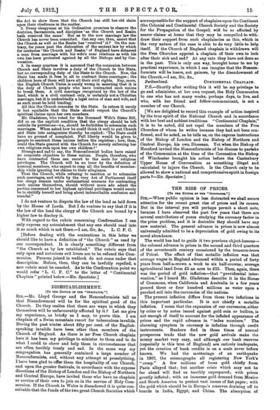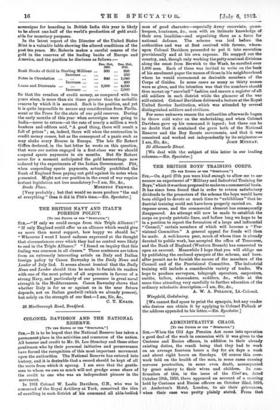THE RISE OF PRICES.
[To vas EDITOR OF THZ "SPZCTATOIL"1
Sig,—When public opinion is less distracted we shall secure attention for the recent great rise of prices and its causes. But in the interval you will perhaps permit a short note, because I have observed the past few years that there are several contributors of yours studying the currency factor in the price problem, and it is desirable they should have any new material. The general advance in prices is now almost universally admitted to be a depreciation of gold owing to its novel abundance.
The world has had to guide it two previous object-lessons- the colossal advance in prices in the second and third quarters of the seventeenth century occasioned by the treasure-trove of Potosi. The effect of that metallic inflation was that average wages in England advanced within a period of forty years from half-a-crown a week to six half-crowns; average agricultural land from £5 an acre to £25. Then, again, there was the period of gold inflation—that "providential inter- vention," as I heard Mr. Gladstone describe it in the House of Commons, when California and Australia in a few years poured three or four hundred millions as water upon a parched soil into the currencies of the nations.
The present inflation differs from those two inflations in this important particular. It is not chiefly a metallic inflation. I mean that the expansion of our currencies, either by coins or by notes issued against gold coin or bullion, is not enough of itself to account for the inflated appearance of prices and the rapid advance in " index numbers." The alarming symptom in currency is inflation through credit instruments. Bankers find in these times of normal prosperous trade that the new gold arrivals make the money market very easy, and although our bank reserves (especially is this true of England) are entirely inadequate, yet the creation of bank credits is on a scale never before known. We bad the mutterings of an earthquake in 1907, the seismographs all registering New York's " creep." A few millions of loose gold chiefly from Paris allayed that ; but another crisis which may not be far ahead will find us terribly unprepared ; with prices greatly inflated ; with an immense gold demand from Mexico and South America to protect vast issues of fiat paper; with the gold which should be in Europe's reserves draining off to hoards in India, Egypt, and China. The absorption of
sovereigns for hoarding in British India this year is likely to be about one-half of the world's production of geld avail- able for monetary purposes.
In the latest report of the Director of the United States Mint is a valuable table showing the altered conditions of the past ten years. Mr. Roberts makes a careful census of the gold in the reserves of the leading banks of Europe and America, and the position he discloses as follows :—
Dec. 31st, Dec. 31st,
1899. 1910.
Bank Stocks of Gold in Sterling Millions Increase ...
Notes in Circulation ... Increase ...
Loans and Discounts ... Increase ...
So that the creation of credit money, as compared with ten years since, is more than six times greater than the metallic reserve by which it is secured. Such is the position, and yet it is quite impossible to secure any consideration from Parlia- ment or the Press for the state of our gold reserves. During the early months of this year when sovereigns were going to India—never to return—at the rate of nearly a million a week bankers and editors said, "A good thing, there will result a fall of prices "; as, indeed, there will when the contraction in credit money comes, but as the consequent of a panic such as may shake every Bourse in Europe. The late Sir Robert Giffen declared, in the last letter he wrote on this question, that were our nation engaged in a first-class war we should suspend specie payments in six months. But Sir Robert never for a moment anticipated the gold haemorrhage now induced by the experiments of the Indian Government. Pitt, when suspending specie payments, actually prohibited the Bank of England from paying out gold against its notes when presented. Might not our position in the event of war require instant legislation not less mandatory P—I am, Sir, &c., 350
...▪ 640 ... 1,040 400 ...▪ 2,000 ... 4,000 ... 2,000 Brede Place. MORETON FREWE N. [Very probably ; but that would no more produce "the end of everything " than it did in Pitt's time.—ED. Spectator.]



















































 Previous page
Previous page